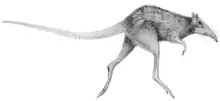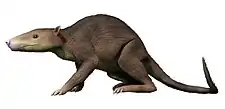Khuduklestes
Khuduklestes is a genus of extinct mammal of uncertain affinities from the Late Cretaceous of China. It is rather similar to the also carnivorous and taxonomically uncertain Oxlestes, being slightly smaller.[1]
| Khuduklestes Temporal range: Late Cretaceous, | |
|---|---|
| Scientific classification | |
| Domain: | Eukaryota |
| Kingdom: | Animalia |
| Phylum: | Chordata |
| Class: | Mammalia |
| Family: | incertae sedis |
| Genus: | †Khuduklestes Sigogneau-Russell et al., 1994 |
| Type species | |
| †Khuduklestes bohlini Sigogneau-Russell et al., 1994 | |
Description
Khuduklestes is currently represented by a single specimen, a vertebral axis, known from Cenomanian deposits in the Gansu Province of China. It is rather similar to Oxlestes and is among the largest vertebral mammalian remains from the Mesozoic, indicating a cat-sized animal.
Classification
Khuduklestes was initially placed in Deltatheroida on the basis of its similarity to Oxlestes. However, much as Oxlestes, its identity as a deltatheroidean has also been questioned, and it has periodically also been considered a member of the eutherian clade of mammals.[2]
References
- Zofia Kielan-Jaworowska, Richard L. Cifelli, Zhe-Xi Luo (2004). "Chapter 12: Metatherians". Mammals from the Age of Dinosaurs: origins, evolution, and structure. New York: Columbia University Press. pp. 425–262. ISBN 0-231-11918-6.
- Guillermo Rougier, New specimen of Deltatheroides cretacicus (Metatheria, Deltatheroida) from the Late Cretaceous of Mongolia, BULLETIN OF CARNEGIE MUSEUM OF NATURAL HISTORY 36(DEC 2004):245-266 · SEPTEMBER 2009


